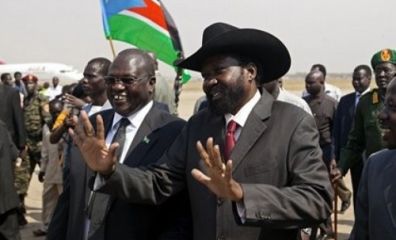S. Sudan’s Kiir, Machar agree to extend transitional period: aide
July 26, 2022 (JUBA) – South Sudan President Salva Kiir and the First Vice President Riek Machar have agreed to extend the current transitional period, citing the need to complete critical benchmarks for the conduct of elections.
A well-placed sourced within the presidency said the two leaders agreed to extend the term of the present coalition government for 32 months.
“His Excellency, the President of the Republic [of South Sudan] and His Excellency, the First Vice President have agreed in principle to extend the lifespan of the current transitional government national unity. The other vice presidents, actually the presidency as a whole agreed”, the presidential aide told Sudan Tribune on Tuesday.
The process, further stated the source, will now be forwarded to the parties signatory to the peace agreement to discuss and incorporate their views before it is taken to the council of ministers, Reconstituted Joint Monitoring and Evaluation Commission (R-JMEC) and then parliament for rectification.
“There is a talk currently going on between the leaders. They are consulting each other as parties, as comrades in the government as colleagues in the liberation struggle, and in their capacities as senior citizens to come to terms with the realities of the situation and forge a consensus. Some are talking of 28 months; others are talking of 32 months,” noted the presidential aide.
“This is now the talk which the parties will have to decide before their decisions are taken to the council of ministers and the Reconstituted Joint Monitoring and Evaluation Commission before it goes to parliament for rectification”, he stressed.
Observers, however, say views of the public on the matter are diverging.
For instance, while some parties to the peace deal support extension of the Revitalized Transitional Government of National Unity (R-TGoNU) when it expires, others have proposed formation of a government of technocrats.
In the past, government and opposition officials had argued that elections can only occur after critical benchmarks are met, citing the graduation of unified forces and deploying them to provide security and protect the country’s population.
There have also been calls for facilitation of the return of refugees, conduct of population census, review and enacting security-related bills, restructuring electoral commission and the need to approve political parties act, among other issues.
(ST)

